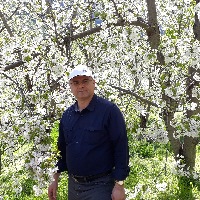Effect of Foliar Application of Salicylic Acid on Yield and Yield Components of Pumpkin under Different Water Deficienies
Pumpkin is one of the valuable medicinal plants which have high oil content in its seeds. The response of pumpkin was examined against controlled water deficiency with spraying salicylic acid under field conditions in 2015 and 2016 in split plot experiment based on complete randomized block design. The plants sprayed with 0, 0.5, 1 and 1.5 mM concentrations of salicylic acid at 5-6 leaf stages. After 15 days plants exposed to -0.3, -1.2 and -1.8 MPa water deficiency. Increasing water deficiency reduced RWC, chlorophyll and carotenoids content, plant height, number of nodes and branches per plant, fruit yield, fruit diameter, seed yield, number of seed per fruit and weight of 1000 seeds while it and also increased the diameter of mesocarp especially in -1.8 MPa treated plants. On the contrary, spraying with salicylic acid resulted in significant increase in RWC, chlorophyll and carotenoids contents, plant height, number of nodes and branches per plant, fruit yield, diameter of fruit, seed yield, number of seed per fruit and weight of 1000 seeds. Haghest salicylic acid effect observed at 1.5 mM concentration. Most of traits under study depicated their significant reduction at -1.8 MPa water deficiency, while other traits like leaf water content, plant height, chlorophyll a, b and total chlorophyll content, nodes per plant, number of branches and mesocarp diameter were reduced at -1.2 MPa. On the other hand, seed per fruit was increased significantly at -1.2 MPa as compared to -0.3 MPa water deficiency. The main reason for increment of seed number per fruit was due to reduction in mesocarp diameter and its weight. It seems that water deficiency changed the partitioning pattern of assimilates from fruit and shifted them to seeds against mesocarp or other parts of fruit. Among the yield components, seed number per fruit and number of fruit per land area had the most effect on yield formation. The variation in seed weight was not significant. According to results, pumpkin may considered as a tolerant plant to soil suction till -1.2 MPa, without a significant reduction in seed yield.
- حق عضویت دریافتی صرف حمایت از نشریات عضو و نگهداری، تکمیل و توسعه مگیران میشود.
- پرداخت حق اشتراک و دانلود مقالات اجازه بازنشر آن در سایر رسانههای چاپی و دیجیتال را به کاربر نمیدهد.




